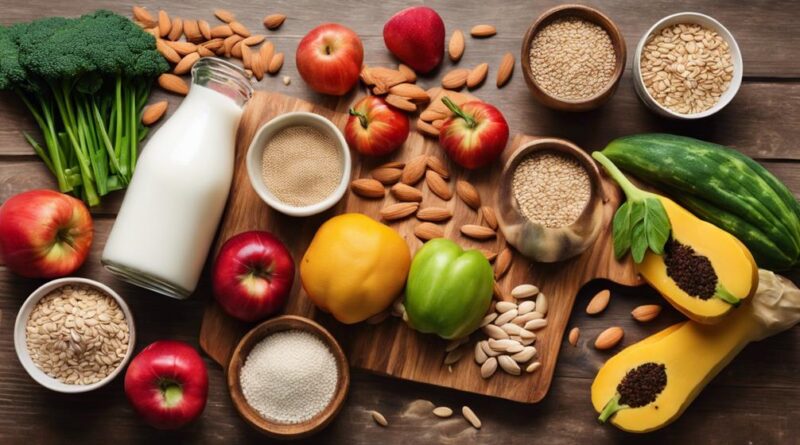Seven Tips for a Gluten-Free All-Natural Diet
Master a gluten-free, all-natural diet with seven key tips: Opt for gluten-free flours like almond or coconut. Check labels for hidden gluten in ingredients like modified food starch. Prioritize whole foods for essential nutrients. Embrace organic produce for clean eating. Cook from scratch for full control over ingredients. Be mindful of cross-contamination risks. Seek support through community groups or online forums for advice. Revolutionize your well-being by making powerful food choices.
Benefits of Going Gluten-Free
Discover the numerous benefits of adopting a gluten-free diet for improved health and overall well-being. By eliminating gluten from your diet, you can experience a range of health benefits, including improved digestion, increased energy levels, and better nutrient absorption. Gluten can be hard for some people to digest, leading to issues like bloating, gas, and fatigue. Going gluten-free can alleviate these symptoms and promote overall digestive health.
In addition to the digestive benefits, a gluten-free diet can also aid in weight loss. Many gluten-containing foods are high in carbohydrates and calories, which can contribute to weight gain. By cutting out gluten, you may naturally reduce your calorie intake and promote weight loss. However, it's essential to focus on whole, unprocessed foods to ensure you're getting the nutrients your body needs while on a gluten-free diet.
Furthermore, gluten-free diets can lead to improved overall well-being by reducing inflammation in the body. Inflammation has been linked to various chronic diseases, including heart disease, diabetes, and certain types of cancer. By reducing inflammation through a gluten-free diet, you may lower your risk of developing these conditions and improve your long-term health.
Understanding Gluten Sensitivity
To better comprehend gluten sensitivity, it's crucial to understand how gluten interacts with the body and the potential effects it can have on individuals. Gluten is a protein found in wheat, barley, and rye. For some people, consuming gluten can trigger an immune response that damages the lining of the small intestine. This condition, known as celiac disease, can lead to various symptoms such as diarrhea, fatigue, and weight loss. In addition to celiac disease, some individuals may experience non-celiac gluten sensitivity, which can cause similar symptoms but without the autoimmune response seen in celiac disease.
For individuals with gluten sensitivity, adopting a gluten-free diet is essential. Fortunately, there are many gluten-free alternatives available in stores, such as gluten-free flours, bread, and pasta. When dining out, it's important to be cautious and inquire about gluten-free options on the menu. Many restaurants now offer gluten-free dishes or can accommodate special dietary needs upon request. By being mindful of the ingredients and cooking methods used, individuals with gluten sensitivity can enjoy dining out without compromising their health.
Understanding gluten sensitivity is key to managing the condition effectively. By choosing gluten-free alternatives and being vigilant about gluten-free dining options, individuals can navigate their dietary needs with confidence and improve their overall well-being.
Importance of Organic Produce
Organic produce offers a multitude of benefits, ranging from reduced exposure to pesticides to higher nutrient content compared to conventionally grown fruits and vegetables. When you opt for organic fruits and vegetables, you're choosing produce that's grown without synthetic pesticides, herbicides, and genetically modified organisms (GMOs). This not only benefits your health but also promotes sustainability by reducing the harmful impact of conventional farming practices on the environment.
By incorporating organic produce into your diet, you're embracing clean eating and reaping the health benefits that come with it. Organic fruits and vegetables are rich in essential vitamins, minerals, and antioxidants, providing your body with the nutrients it needs to thrive. Research has shown that organic produce tends to have higher levels of beneficial nutrients like vitamin C, iron, magnesium, and phosphorus compared to conventionally grown produce.
Moreover, supporting organic farming practices encourages sustainable agriculture, which focuses on preserving biodiversity, soil health, and water quality. Choosing organic options contributes to a healthier planet and supports farmers who prioritize environmentally friendly methods. When you prioritize organic produce in your diet, you aren't only nourishing your body but also playing a vital role in promoting a more sustainable food system for future generations.
Avoiding Hidden Gluten Ingredients
When selecting food items for your gluten-free all-natural diet, it's crucial to be vigilant about avoiding hidden gluten ingredients. Hidden gluten sources can be tricky to identify, but with the right knowledge, you can navigate through your gluten-free baking and cooking successfully. Here are some key tips to help you steer clear of hidden gluten ingredients.
One of the primary things to watch out for in gluten-free baking is the type of flour you use. Opt for gluten-free alternatives such as almond flour, coconut flour, or chickpea flour. These options aren't only free from gluten but also add a unique flavor and texture to your baked goods.
Furthermore, pay close attention to food labels when shopping for ingredients. Ingredients like modified food starch, malt extract, and hydrolyzed vegetable protein can often contain hidden gluten. It's essential to choose products that are explicitly labeled as gluten-free to avoid any potential cross-contamination or hidden sources of gluten.
When dining out or purchasing pre-made foods, always inquire about the ingredients and preparation methods to ensure they align with your gluten-free diet. Restaurants and packaged foods may use thickeners or sauces that contain gluten, so it's best to be cautious and proactive in your approach.
Embracing Whole Foods
Embrace a variety of nutrient-rich whole foods to enhance your gluten-free all-natural diet. Whole foods are minimally processed and provide essential nutrients for your body. When following a gluten-free diet, it's crucial to focus on whole foods to ensure you're getting the necessary vitamins, minerals, and fiber. Meal prep can be a game-changer when incorporating whole foods into your diet. By prepping ingredients in advance, you can make healthier choices throughout the week and avoid the temptation of processed foods that may contain hidden gluten ingredients.
Seasonal eating is another key aspect of embracing whole foods. Eating seasonally not only supports local farmers and reduces environmental impact but also ensures that you're consuming fresh produce at its peak in terms of flavor and nutrients. Include a variety of fruits, vegetables, whole grains, lean proteins, and healthy fats in your meals to create a well-rounded gluten-free diet.
When meal prepping, consider incorporating a mix of colorful fruits and vegetables to maximize the nutritional benefits. Experiment with different grains like quinoa, brown rice, and buckwheat to add diversity to your meals. Don't forget to include lean proteins such as chicken, fish, tofu, or legumes for a balanced diet. By embracing whole foods through meal prep and seasonal eating, you can create delicious gluten-free meals that nourish your body and support your overall health.
Reading Labels Carefully
Carefully scrutinize food labels to identify any hidden gluten ingredients and make informed choices for your gluten-free all-natural diet. Label education is crucial for individuals following a gluten-free diet as gluten can hide in unexpected places. Ingredient awareness is key to avoid gluten-containing products. When reading labels, focus on the ingredients list rather than just the front label claims. Look for common gluten-containing ingredients like wheat, barley, rye, and oats that aren't labeled as gluten-free. Manufacturers are required to list major allergens, including wheat, but gluten can also be present in additives like malt flavoring, modified food starch, or hydrolyzed vegetable protein.
To ensure a gluten-free and all-natural diet, be vigilant about cross-contamination warnings on labels, as even trace amounts of gluten can be harmful to those with gluten sensitivity or celiac disease. Look for certifications like the Certified Gluten-Free label, which indicates that the product has undergone testing to ensure it meets gluten-free standards. Remember that natural flavors can sometimes contain gluten, so it's essential to contact the manufacturer if you're unsure.
Cooking From Scratch

To maintain a gluten-free all-natural diet, consider preparing meals from scratch using fresh ingredients to have better control over what you consume. Meal prep is essential when cooking from scratch as it allows you to plan your meals ahead of time, ensuring that you have all the necessary ingredients on hand. This can help you avoid the temptation of reaching for processed and potentially gluten-containing foods when you're short on time or energy.
When cooking from scratch, you have the opportunity to make healthy swaps to ensure your meals are gluten-free and all-natural. For example, instead of using store-bought sauces that may contain hidden gluten and artificial additives, you can easily make your own using fresh herbs, spices, and other natural ingredients. Similarly, you can swap out refined grains like white flour for gluten-free alternatives such as almond flour, coconut flour, or quinoa flour to boost the nutritional value of your dishes.
Seeking Support and Resources
Consider connecting with local support groups and online resources to enhance your journey towards maintaining a gluten-free all-natural diet. Seeking support and resources can provide you with valuable information, tips, and encouragement to navigate the challenges of a specialized diet. Here are some key ways to find the support you need:
- Community groups: Joining local community groups focused on gluten-free living can offer you a sense of belonging and understanding. These groups often organize events, workshops, and cooking classes that can help you expand your knowledge and connect with like-minded individuals.
- Online forums: Engaging in online forums dedicated to gluten-free diets can be a convenient way to seek advice, share experiences, and learn about new products or recipes. Platforms like Reddit's gluten-free subreddit or dedicated Facebook groups can be excellent sources of support.
- Cooking classes: Enrolling in gluten-free cooking classes can boost your culinary skills and provide you with practical tips for preparing delicious gluten-free meals at home.
- Nutritionists: Consulting with a nutritionist who specializes in gluten-free diets can help you ensure that you're meeting your nutritional needs while avoiding gluten-containing foods.
- Cookbook clubs: Joining a gluten-free cookbook club can introduce you to a variety of recipes and cooking techniques while fostering a sense of community with others who share your dietary preferences.
Conclusion
In conclusion, adopting a gluten-free all-natural diet can bring numerous benefits to your health and well-being. By understanding gluten sensitivity, choosing organic produce, avoiding hidden gluten ingredients, embracing whole foods, reading labels carefully, cooking from scratch, and seeking support and resources, you can successfully navigate this dietary lifestyle.
Remember, making informed choices and prioritizing your health is key to maintaining a balanced and nutritious gluten-free diet.
